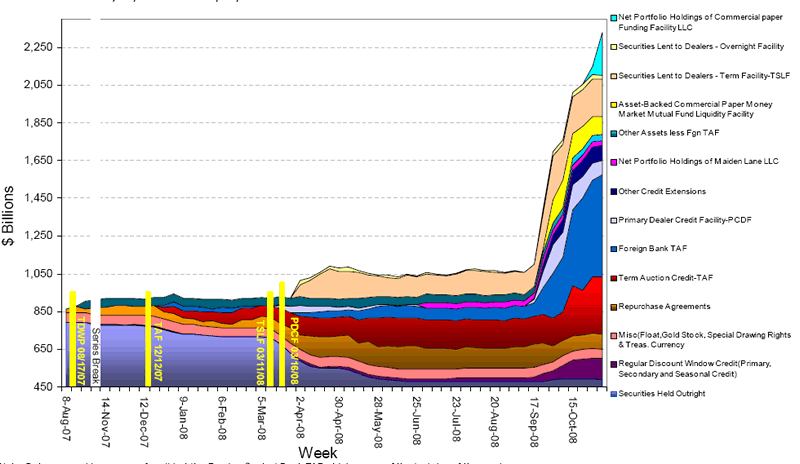Results 1 to 1 of 1
Thread Information
Users Browsing this Thread
There are currently 1 users browsing this thread. (0 members and 1 guests)
-
11-10-2008, 03:25 PM #1Senior Member


- Join Date
- May 2007
- Location
- South West Florida (Behind friendly lines but still in Occupied Territory)
- Posts
- 117,696
Three Trends Driving U.S. Toward Economic and Dollar Collaps
Three Trends Driving U.S. Toward Economic and Dollar Collapse
Economics / US Debt
Nov 09, 2008 - 01:36 PM
By: Eric_deCarbonnel
TREND #1: Falling Tax revenues . Every month of job losses and every company that fails results in more lost tax revenue. In 2007, the government collected $2.568 trillion from taxpayers. It will be less this year and next.
If the revenue loss follows the pattern set during the great depression, it will look like this:
2007: 2.568 Trillion
2008: 2.183 Trillion
2009: 1.618 Trillion
2010: 1.387 Trillion
2011: 1.027 Trillion
TREND #2: Rapidly increasing US debt and liabilities. As the government funds two wars and tries to prop up an insolvent financial system, it is quickly sinking into a financial black hole. The US has over 10 trillion in debt outstanding, 12.8 Trillion borrowed from Social Security, and has issued 16 trillion in guarantees (see below). The government being the government, they will keep throwing more and more money at the financial crisis until something prevents them from throwing more.
Current Government's liabilities :
National Debt ($10.5 trillion)
Money borrowed and spent from Social Security ($12 trillion)
Toxic assets in the Fed's balance sheets ($2.2 trillion)
Underfunded federal pensions ($1 trillion)
Total = $26.5 Trillion in debt
Assets guaranteed by the Government's "full faith and credit " :
Bank deposits (6.5 trillion)
Freddie/Fannie debt (5 trillion)
Money market funds (3 trillion, 1 year)
Interbank lending (? trillion)
senior debt of all FDIC-insured institutions (1.5 trillion, 3 years)
pensions backstopped by PBGC (3+ trillion)
Total: = $19 trillion guaranteed (so far...)
fed's balance sheet
The best example of the US government's complete loss of fiscal sanity is the financial horror story which is the fed's balance sheet. The chart below from Cumberland Advisors offers a visual depiction of the madness:

(Source: Federal Reserve Board of Governors Statistical Release H.4.1 Data through 11/5/08.)
TREND #3: Decreasing appetite for US debt among foreign governments . China and others have been willing to prop up the dollar and buy treasuries because US consumption has helped fuel their economic growth. However, we are fast reaching the point where the benefits of allowing a US collapse are outweighing the costs. If foreign central banks stopped financing our debt, the dollar's value would plummet, and the loss of purchasing would greatly reduce the percentage of the world's oil we consume (which is nearly 50% right now). The rest of the would reap a windfall from lower prices for oil and other commodities as their currencies appreciated again the dollar. Currently, Asian countries are still propping up the dollar to help their export sectors, but that could change rapidly as consumer spending goes off a cliff.
THESE TRENDS WILL CONTINUE UNTIL THE BREAKING POINT
Within the next month or two, these three trends will reach their unavoidable conclusion: a loss of faith in US debt and the dollar . This will produce something never before seen in modern economics: simultaneous deflation and hyperinfation . Foreign and domestic investors will rush move their wealth out of the dollar by selling US assets (Treasuries, bonds, stocks , etc...). The selling of US assets will accelerate the deflationary collapse we have experienced so far this year, and the move out of the dollar will drive up the costs of oil, food, and other commodities we consume.
Here are a couple of ways to protect your wealth against this outcome:
--- invest in physical gold and other precious metals. Gold does well during deflationary and inflationary periods. For example, from 1929 to 1934, gold went from $21 to $35 with its purchasing power rosing 17 times, and in the inflationary 80s gold hit an inflation-adjusted peak of over $2,000. In the next few months, I expect gold to soar above 2000 again.
---invest in export oriented US companies whose share price has been depressed by the dollar rally. For example, Coal Producers (MEE, BTU, JRCC) look attractive at today's fire sale prices.
---invest in China and other nations that have undervalued currencies and low national debt. These foreign markets have been aggressively sold off in the last three month as investored panicked into dollars.
Finally, it might become quite unpleasant to live in a country experiencing an economic and currency collapse. America is likely to go from developed nation to third world country in the span of a year or two, and there is likely going to be a lot of anger about the drop in living standards. Should you manage to protect your wealth during the coming collapse (by buying gold), It would be wise to be ready to take a long vacation to avoid any potential social unrest.
By Eric deCarbonnel
http://www.marketskeptics.com
Eric is the Editor of Market Skeptics
http://www.marketoracle.co.uk/Article7213.htmlJoin our efforts to Secure America's Borders and End Illegal Immigration by Joining ALIPAC's E-Mail Alerts network (CLICK HERE)


 LinkBack URL
LinkBack URL About LinkBacks
About LinkBacks




 Reply With Quote
Reply With Quote

Democrat Rep. Hands Out Cards with Instructions to Help Illegal...
05-11-2024, 12:13 PM in illegal immigration News Stories & Reports